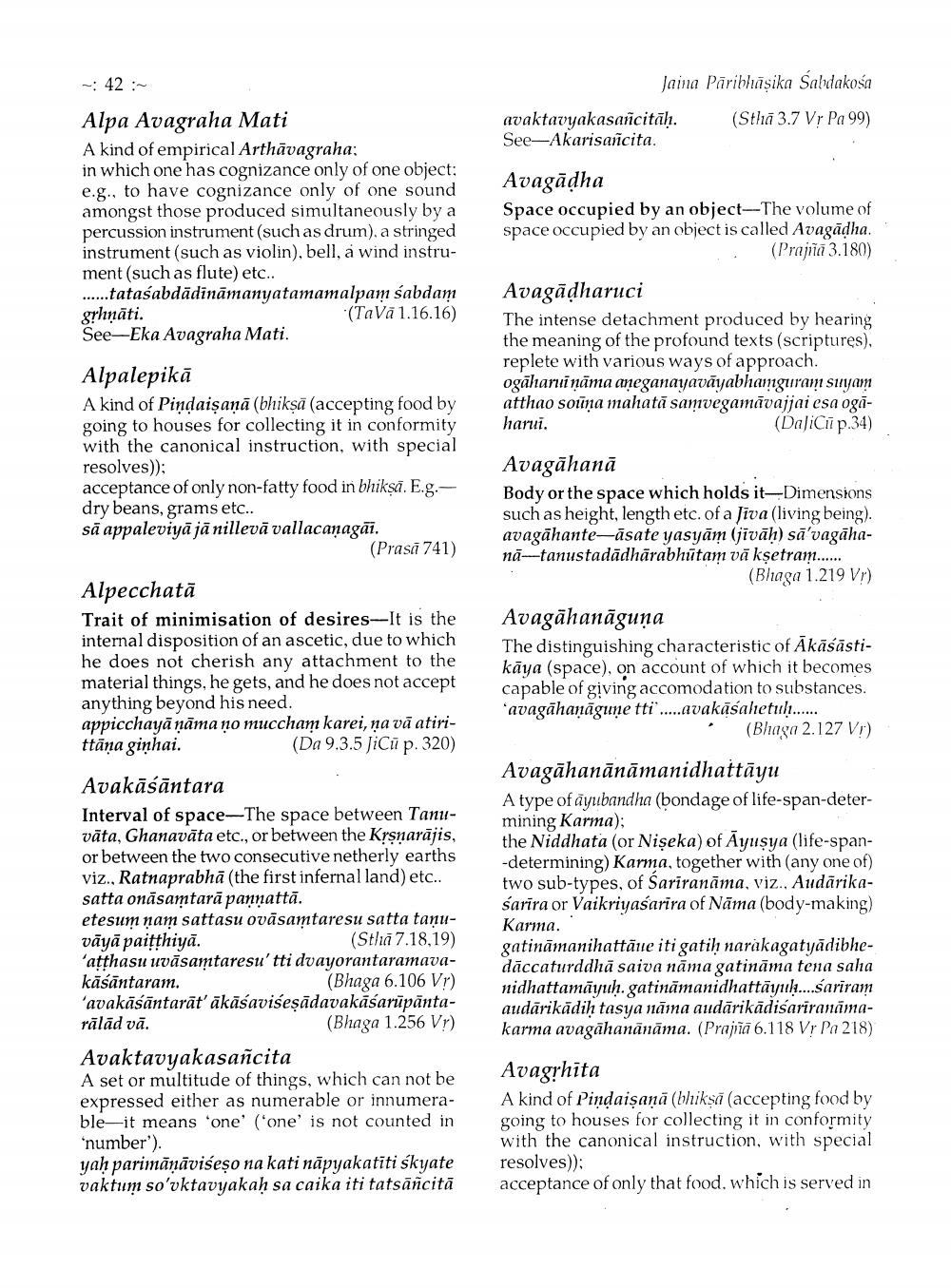________________
Jaina Pāribhāşika Sabdakosa avaktavyakasancitān. (Sthā 3.7 Vr Pa 99) See-Akarisancita.
-: 42 :Alpa Avagraha Mati A kind of empirical Arthāvagraha; in which one has cognizance only of one object: e.g., to have cognizance only of one sound amongst those produced simultaneously by a percussion instrument (such as drum), a stringed instrument (such as violin), bell, a wind instrument (such as flute) etc.. ......tatasabdādināmanyatamamalpam sabdam grhņāti.
(Tavā 1.16.16) See-Eka Avagraha Mati.
Avagādha Space occupied by an object--The volume of space occupied by an object is called Avagādha.
(Prajia 3.180)
Avagādharuci The intense detachment produced by hearing the meaning of the profound texts (scriptures), replete with various ways of approach. ogāharuīņāma aneganayavāyabhamguram suyam atthao solīņa mahatā samvegamāvajjai esa ogiharui.
(DaliCap.34)
Alpalepikā A kind of Pindaişaņā (bhikṣā (accepting food by going to houses for collecting it in conformity with the canonical instruction, with special resolves)); acceptance of only non-fatty food in bhikṣä. E.g.dry beans, grams etc.. sā appaleviyā jā nillevā vallacanagāi.
(Prasā 741)
Avagāhanā Body or the space which holds it-Dimensions such as height, length etc. of a Jiva (living being). avagāhante-āsate yasyām (jivāḥ) sä'vagāhanā--tanustadădhārabhūtam vä kşetram.....
(Bhaga 1.219 Vr)
Alpecchatā Trait of minimisation of desires--It is the internal disposition of an ascetic, due to which he does not cherish any attachment to the material things, he gets, and he does not accept anything beyond his need. appicchayā ņāma ņo muccham karei, na vā atirittāna ginhai.
(Da 9.3.5 JiCū p. 320)
Avagāhanāguna The distinguishing characteristic of Ākāśāstikāya (space), on account of which it becomes capable of giving accomodation to substances. *avagāhaņāgune tti......avakāśahetuh......
(Bhaga 2.127 Vr)
Avakāśāntara Interval of space-The space between Tanuvāta, Ghanavāta etc., or between the Kysnarājis, or between the two consecutive netherly earths viz., Ratnaprabhā (the first infernal land) etc.. satta onāsamtarā pannattā. etesum ņam sattasu ovāsamtaresu satta taņuvāyā paitthiyā.
(Stha 7.18,19) 'atthasu uvāsamtaresu' tti dvayorantaramavakāśāntaram.
(Bhaga 6.106 Vr) 'avakāśāntarāt' ākāśaviseşādavakāśarūpāntarālād vā.
(Bhaga 1.256 Vr) Avaktavyakasañcita A set or multitude of things, which can not be expressed either as numerable or innumerable—it means 'one' ('one' is not counted in *number'). yah parimānāviseso na kati nāpyakatiti skyate vaktum so'vktavyakaḥ sa caika iti tatsāncitā
Avagāhanānāmanidhattāyu A type of āyubandha (bondage of life-span-determining Karma); the Niddhata (or Nişeka) of Āyuşya (life-span-determining) Karma, together with any one of) two sub-types, of Sariranāma, viz., Audārikaśarīra or Vaikriyasarira of Nāma (body-making) Karma. gatināmanihattājie iti gatih narakagatyādibhedāccaturddhā saiva nāma gatināma tena saha nidhattamāyuh. gatināmanidhattāyul....sariram audārikādih tasya nāma audārikādiśariranamakarma avagāhanānāma. (Prajiã 6.118 V? Pa 218)
Avagļhita A kind of Pindaişaņā (bhikṣā (accepting food by going to houses for collecting it in conformity with the canonical instruction, with special resolves)); acceptance of only that food, which is served in




